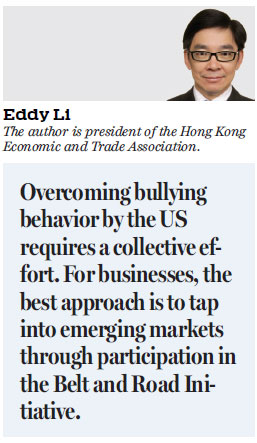AEO certification can help cushion blows from trade dispute
Updated: 2018-09-05 09:40
(HK Edition)
|
|||||||||
In the wake of the ongoing Sino-US trade dispute, the Trade and Industry Department, the Hong Kong Export Credit Insurance Corporation and the Hong Kong Trade Development Council have introduced some specific measures to help alleviate its adverse effects on Hong Kong enterprises. These measures include enhancing some existing subsidy funds, introduction of additional pre-shipment cover for free and expansion of the geographical scope of SME Export Marketing Fund and BUD Fund to cover the ASEAN market. Constantly updating their websites helps enterprises keep abreast of latest developments in the market.
Local companies can also avail themselves of an approach that can help them absorb the impact of trade wars - by applying for AEO certification from Hong Kong Customs.
AEO stands for "authorized economic operator". The holder of this certificate is entitled to benefits akin to obtaining a green permit for international trade, which will empower enterprises' expedition into overseas markets.

The AEO certification program was advocated by the World Customs Organization for strengthening international supply chain security and facilitating movement of legitimate goods. Under the program, customs from various regions form partnerships with the industry to collaboratively reduce barriers to customs procedures in order to enhance international trade efficiency. Back in 2010, the Customs and Excise Department adopted this certification program and eligible Hong Kong enterprises were encouraged to obtain accreditation. At present, our city is in AEO Mutual Recognition Agreements (MRA) with the Chinese mainland and eight other economies. These include Singapore, Japan, Malaysia and Australia.
AEO is administered under an open and voluntary certification regime, which is open to all stakeholders, irrespective of their business scale, involved in the international supply chain, such as manufacturers, importers, exporters, freight forwarders, warehouse operators, carriers, etc. They can participate in the program free of any accreditation fees as long as they are compliant with the relevant safety standards. Once the company has passed on-site inspections and assessment by customs, it will be granted AEO membership, indicating that they are "trustworthy". Therefore, the transshipment of goods will be subject to fewer inspections and enjoy priority in clearance. The expedited customs procedures can significantly reduce the processing time and trade costs, which will boost business competitiveness.
As the AEO certification is closely tied to Hong Kong's reputation, it is not easy to attain it under stringent inspections by customs officers. Complying with relevant standards is a precondition; it is thus imperative for participating companies to assess their internal policies and operating procedures. They also need to address any shortfalls in accordance with the requirements set out in the accreditation criteria.
Upon receipt of the application, customs designates officers to conduct on-site assessments to validate compliance with required safety measures and procedures, such as having well-documented business records management system and proof of financial stability. The AEO certificate, which is subject to renewal after a valid three-year period, will only be issued upon satisfactory completion of the assessment. Nevertheless, if a company is found to fall short of the required standards and fails to fix security loopholes or has committed acts which violated the law, the accreditation and the relevant preferential rights will be revoked immediately. Along with bearing the legal liability, the company will also be prohibited from applying for the certificate within two years.
That only 40 firms are registered under the AEO program in Hong Kong suggests many companies are unaware of this regime. Therefore, I suggest the relevant authorities increase publicity to allow businesses to understand the benefits of participating in the program. It will help create a better business environment. It will be one that demonstrates the city's commitment to safeguarding the integrity of the global supply chain. It will also be one that's conducive to strengthening our competitive advantage as a preeminent international trade center and regional logistics hub. The AEO has considerable significance in the current political landscape at a time when trade wars are being waged by the United States. Corporations around the globe are looking for ways to reduce their dependence on the US market. Many are hoping to tap into emerging markets with the hope of finding reliable trade partners. The AEO can not only serve as a "guiding light" for locating business partners, but can also expand mutual recognition as an effective way to deal with trade protectionism.
Overcoming bullying behavior by the US requires a collective effort. For businesses, the best approach is to tap into emerging markets through participation in the Belt and Road Initiative. Now, 33 of the 64 Belt and Road partner countries have adopted the AEO system. China has already established MRA with 14 of them; the nation strives to expand the number to cover all AEO-countries along the route by 2020. As a special administrative region, it is logical for Hong Kong to align itself with this national policy. Then, our city can "effortlessly" reap the benefits arising from expansion of the MRA.
(HK Edition 09/05/2018 page15)